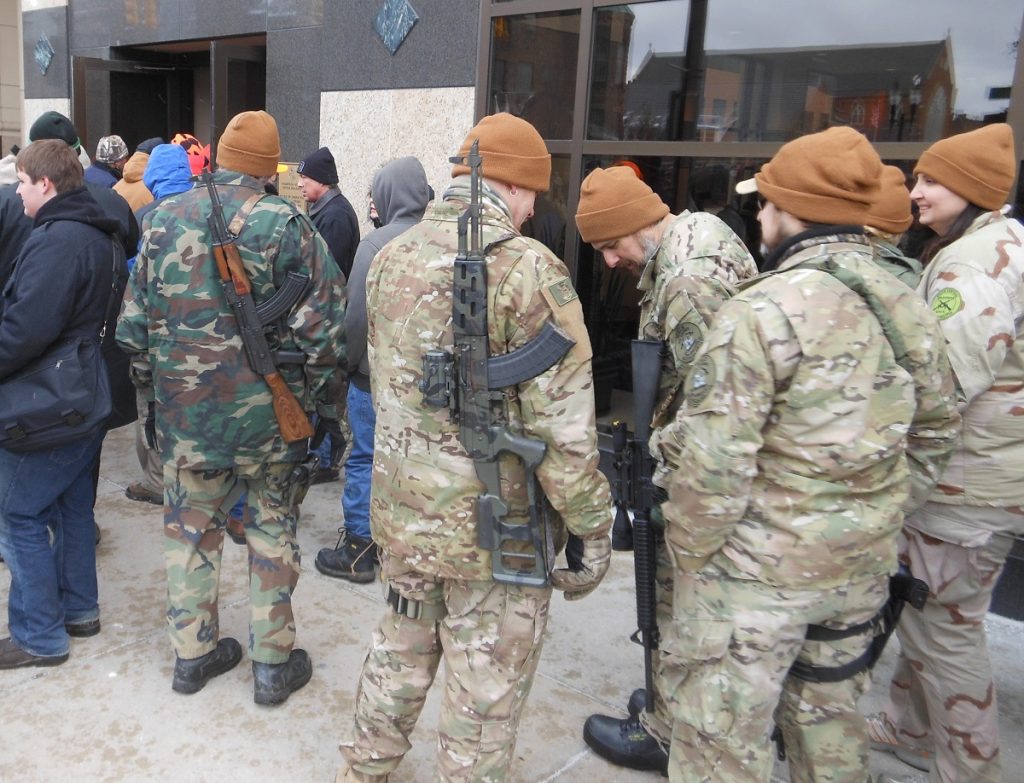The Constitution Protects a Well Regulated Militia. Efforts to Clarify Began Shortly After
With anti-government sentiment on the rise in recent decades, the meaning of the term “militia” in popular culture is not what the Founding Fathers intended.

As part of 101.9 WDET’s Book Club, we’re inviting the Detroit region to examine and discuss the text that impacts every resident of the United States: The Constitution. Whether you’re revisiting the documents or reading them for the first time, join us in reading along and engaging in civil conversations with your community.
The Second Amendment of the U.S. Constitution reads: “A well regulated Militia, being necessary to the security of a free State, the right of the people to keep and bear Arms, shall not be infringed.”
While that amendment protects gun ownership, the first part of that line, “a well regulated militia,” has been used more recently by some domestic fringe groups. They put the wording to use when justifying their perceived right to take matters into their own hands.
The Origin of the Term “Militia”
“We’ve seen this attempt to create a new mythology of what the Second Amendment protects.” –Mary McCord, Georgetown Law
Mary McCord is executive director for the Institute of Constitutional Advocacy and Protection at Georgetown Law. She says the origin of the term “militia” in the founding document dates back to before the creation of the United States.
“When we just had the colonies,” says McCord, “the colonies did not want to have standing armies for their defense. So instead they used the militia.”
She says in those days, nobody questioned the meaning of the phrase.
“It meant the State would be able to call you up,” McCord explains, “if they needed to defend against enemies foreign or domestic. Meaning it could’ve been American Indians they were defending against; it could’ve been threats from abroad.”
However, McCord says efforts to clarify the meaning date back more than two centuries, when 25 states signed anti-militia laws into effect. An 1886 Supreme Court ruling in the case of Presser v. Illinois upheld the legality of such rules.
“It’s really been I think in more modern times,” says McCord, “with the rise the ubiquity of firearms, and the National Rifle Association, and anti-government sentiments and all of this, that we’ve seen this attempt to create a new mythology of what the Second Amendment protects.”
Militias Today
“I’m not sure anyone even in Michigan had heard of the Wolverine Watchmen.” –Javed Ali, University of Michigan
Javed Ali, an associate professor at the University of Michigan’s Gerald R. Ford School of Public Policy, says while it’s estimated there are about 200 private militias nationwide, the actual number is likely higher — the unregulated nature of the groups making them hard to keep track of.
“And a great example of that is, go back in time to fall of 2020,” says Ali. “I’m not sure anyone even in Michigan had ever heard of the Wolverine Watchmen.”
That’s the group that plotted to kidnap Gov. Gretchen Whitmer. Before scheming to abduct her, Ali says the Wolverine Watchmen had not broken any laws.
“Their association in that group in and of itself, that’s not what got them in trouble,” says Ali. “What got them in trouble was the plot to kidnap Governor Whitmer.”
Legal Status
“The military shall in all cases and at all times be in strict subordination to the civil power.” –Michigan Constitution, Art. 1, Sec. 7
Ali says legal scholars have long debated whether laws could be made to better prevent the formation of militant groups early on. He says doing so would be difficult without infringing on freedoms the U.S. Constitution is designed to protect, such as the right to bear arms and express political views.
“And this is one of the really fascinating debates,” says Ali, “about domestic extremism and domestic terrorism inside the United States.”
But what about the wording of the Second Amendment itself? Could modifying the line help discourage the formation of future militia groups, looking to validate their concept at a surface level?
Mary McCord says it’s probably too late to make that change.
“Changing the Constitution is always a big bit of business,” says McCord, “It requires a Constitutional Amendment, that requires two-thirds of the states to ratify it, it’s complicated and it takes a long time.”
McCord says she thinks it’s best to rely on legal precedents that have already been set. She says in addition to the laws many states passed in the 1800s, 48 different state constitutions, including Michigan, prohibit private militias.
Listen: Learn more about the history of militias under the U.S. Constitution.
Join WDET in reading the Constitution.
This summer, we invite you to get involved as we explore our nation’s founding document.
Sign up to get your free pocket Constitution
Trusted, accurate, up-to-date.
WDET strives to make our journalism accessible to everyone. As a public media institution, we maintain our journalistic integrity through independent support from readers like you. If you value WDET as your source of news, music and conversation, please make a gift today.
